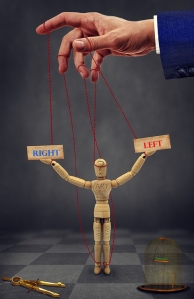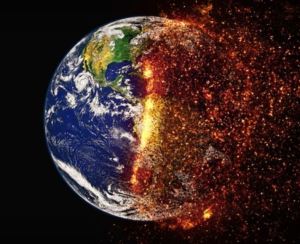Categoría: Distopía
Errores que refuerzan a populismos y nacionalismos.
 Los cuadros políticos, a todos los niveles, de lo que podríamos denominar como “izquierda” europea (aunque serían extensibles las consideraciones del artículo a otras áreas del planeta) llevan demasiado tiempo cometiendo una serie de graves errores que han reforzado, cuando no generado, dinámicas de consecuencias potencialmente nefastas para las democracias, las libertades, el estado social y la igualdad.
Los cuadros políticos, a todos los niveles, de lo que podríamos denominar como “izquierda” europea (aunque serían extensibles las consideraciones del artículo a otras áreas del planeta) llevan demasiado tiempo cometiendo una serie de graves errores que han reforzado, cuando no generado, dinámicas de consecuencias potencialmente nefastas para las democracias, las libertades, el estado social y la igualdad.
Es un grave error olvidar que existen buenas razones para que muchos ciudadanos europeos se sientan estafados con el modelo de Unión Europea diseñado por las élites económicas y financieras a su medida e impuesto a través de una clase política capturada por su mediocridad, su corrupción, su desinterés, su arribismo o su miedo, en un contexto de lobbismo institucionalizado que opera con mayor o menor opacidad en función de lo estéticamente presentable o la legalidad de los intereses que pretenden imponer.
La crisis del cambio climático antropogénico. Proyecciones para 2100.
 En el volumen recientemente publicado, The Climate Change Crisis (2018), Ross Michael Pink, analiza el cambio climático como un fenómeno complejo y global con profundas repercusiones, tanto para el desarrollo humano y de las sociedades como para el entorno ecológico y medioambiental planetario. Tras un detallado examen de la situación en países como EE.UU. Canadá, Brasil, Ecuador, Argentina,Tailandia, Myanmar (Birmania), Japón, China, Kenia, Sudáfrica, Bostwana, India, Egipto, Israel, Jordania, Reino Unido, Italia y Grecia, llega a la conclusión de que actualmente, la carencia de visión y previsión respecto a la mitigación y adaptación a los efectos del cambio climático, conllevará que poblaciones y naciones enteras sufran, se vean diezmadas o, incluso, perezcan, a causa de las sequías, las crisis sanitarias y la destrucción del medio ambiente. Pink afirma que las señales son claras e innegables en todas partes del mundo donde los fenómenos meteorológicos desencadenados por el cambio climático son cada vez más evidentes y peligrosos.
En el volumen recientemente publicado, The Climate Change Crisis (2018), Ross Michael Pink, analiza el cambio climático como un fenómeno complejo y global con profundas repercusiones, tanto para el desarrollo humano y de las sociedades como para el entorno ecológico y medioambiental planetario. Tras un detallado examen de la situación en países como EE.UU. Canadá, Brasil, Ecuador, Argentina,Tailandia, Myanmar (Birmania), Japón, China, Kenia, Sudáfrica, Bostwana, India, Egipto, Israel, Jordania, Reino Unido, Italia y Grecia, llega a la conclusión de que actualmente, la carencia de visión y previsión respecto a la mitigación y adaptación a los efectos del cambio climático, conllevará que poblaciones y naciones enteras sufran, se vean diezmadas o, incluso, perezcan, a causa de las sequías, las crisis sanitarias y la destrucción del medio ambiente. Pink afirma que las señales son claras e innegables en todas partes del mundo donde los fenómenos meteorológicos desencadenados por el cambio climático son cada vez más evidentes y peligrosos.
Las escalofriantes proyecciones climáticas que realiza para el año 2100 son las siguientes: Sigue leyendo
Big Data y Data Mining ¿Oportunidad o distopía? (y III)
La entrada se encuentra publicada en el siguiente enlace:
http://elperiscopi.com/big-data-y-data-mining-oportunidad-o-distopia-y-iii/
http://www.attac.es/2016/10/08/big-data-y-data-mining-oportunidad-o-distopia-y-iii/
http://www.attacmallorca.es/2016/10/08/big-data-y-data-mining-oportunidad-o-distopia-y-iii/
La bibliografía empleada en las tres partes del artículo es la siguiente.
BIBLIOGRAFÍA
Aggarwal, Charu. 2015. Data Mining: The Textbook. New York: Springer.
Albrecht, Karl. 2014. “The Information Revolution’s Broken Promises.” The Futurist. http://www.karlalbrecht.com/downloads/Albrecht-IR-BrokenPromises-WorldFutureSociety.pdf.
Batyko, Richard. 2016. “Ground-Up Expert: Everyday People and Blogs.” In Debates for the Digital Age: The Good, the Bad, and the Ugly of Our Online World, 176–89. Santa Barbara: Praeger.
Beckstead, Nick, Nick Bostrom, Niel Bowerman, Owen Cotton-Barratt, William MacAskill, Seán ÓhÉigeartaigh, y Toby Ord. 2014. “Unprecedented Technological Risks.” Global Priorities Project. http://globalprioritiesproject.org/2015/02/unprecedented-technological-risks/.
Cowen, Tyler. 2013. Average Is Over. Powering America Beyond The Age Of The Great Stagnation. New York: Penguin Books.
Fischer-Hübner, Simone, y Leonardo Martucci. 2014. “Privacy in Social Collective Intelligence Systems.” In Social Collective Intelligence. Combining the Powers of Humans and Machines to
Build a Smarter Society, 105–24. Heidelberg: Springer.
Greenfield, Susan. 2015. Mind Change: How Digital Technologies Are Leaving Their Mark on Our
Brains. New York: Random House.
Hareesh, Boinepelli. 2015. “Applications of Big Data.” In Big Data A Primer, 161–79. New Delhi: Springer.
Helbing, Dirk. 2015. Thinking Ahead – Essays on Big Data, Digital Revolution, and Participatory Market Society. Zürich: Springer.
Hrushikesha, Mohanty. 2015. “Big Data: An Introduction.” In Big Data. A Primer, 11:1–28. Studies in Big Data. New Delhi: Springer.
Kitchin, Rob. 2014. The Data Revolution. Big Data, Open Data, Data Infrastructures and Their
Consequences. Los Angeles: Sage.
Krugman, Paul. 2015. “The Big Meh.” The New York Times, May 25. http://www.nytimes.com/2015/05/25/opinion/paul-krugman-the-big-meh.html?_r=0.
Lagore, Justin. 2016. “Self-Promotion for All! Content Creation and Personal Branding in the Digital Age.” In Debates for the Digital Age: The Good, the Bad, and the Ugly of Our Online World, 190– 205. Santa Barbara: Praeger.
Mayer-Schönberger, Viktor, and Kenneth Cukier. 2013. Big Data. A Revolution That Will Transform How We Live, Work, and Think. New York: Houghton Mifflin Harcourt Publishing Company.
Schmidt, Eric, and Jared Cohen. 2013. The New Digital Age: Reshaping the Future of People, Nations and Business. New York: ALFRED A. KNOPF.
Sola-Morales, Salomé. 2016. “Rethinking Digital Democracy in a Time of Crisis: The Case of Spain.” In Debates for the Digital Age: The Good, the Bad, and the Ugly of Our Online World, 129–46. Santa Barbara: Praeger.
Big Data y Data Mining ¿Oportunidad o distopía? (I)
Podéis encontrar el texto del artículo en el siguiente enlace:
http://www.attac.es/2016/09/29/big-data-y-data-mining-oportunidad-o-distopia-i-2/
http://elperiscopi.com/big-data-y-data-mining-oportunidad-o-distopia-i/